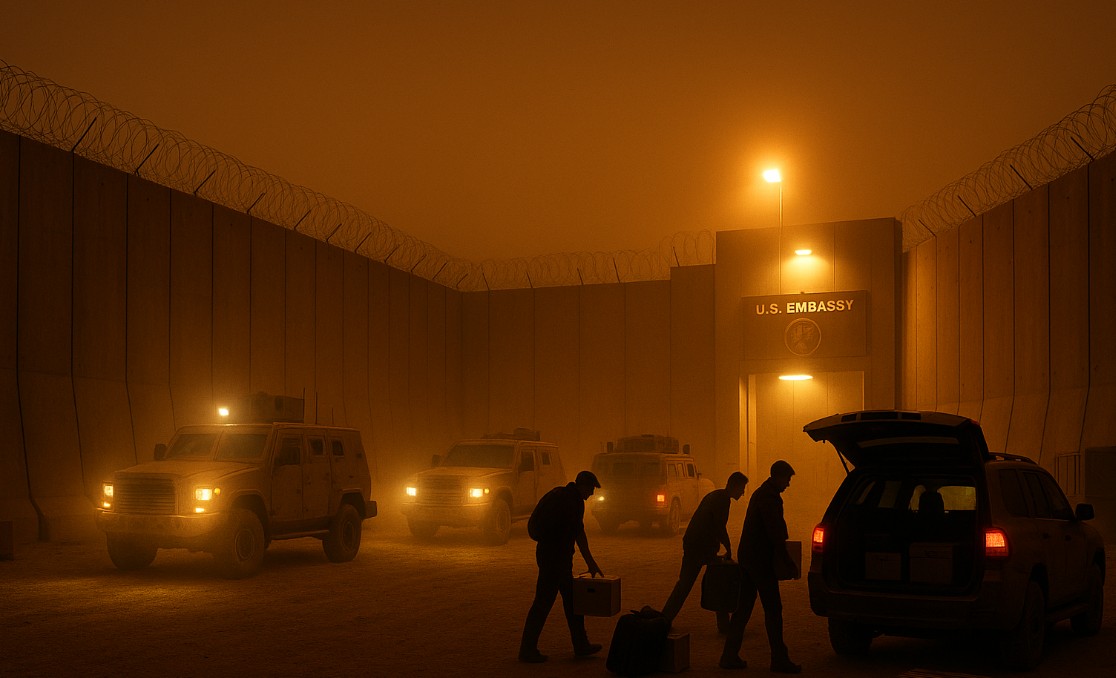
The Fuse Is Lit: Why the U.S. Is Evacuating Embassies as Iran and Israel Edge Toward Confrontation
Tentions rise in the Middle East as confrontation with Iran escalates.
A Region on Edge
It’s a scene that feels all too familiar: armored convoys, hurried goodbyes, and the quiet tension of diplomats packing up under the shadow of possible war. This week, the United States ordered the partial evacuation of its embassy in Baghdad and authorized the voluntary departure of dependents from embassies across the Middle East, including Bahrain and Kuwait. The move comes as the region teeters on the brink, with Israel reportedly preparing for a possible strike on Iran and nuclear negotiations between Washington and Tehran at a standstill.
I remember the last time embassy staff were pulled from Baghdad, back in 2020. The mood then was anxious but not quite as electric as it is now. This time, the stakes feel higher, the rhetoric sharper, and the sense of impending escalation more palpable.
The Nuclear Stalemate
At the heart of the crisis is the impasse over Iran’s nuclear program. The U.S. and Iran have been locked in a diplomatic dance, with Washington seeking limits on Tehran’s nuclear ambitions in exchange for sanctions relief. But talks have stalled, and President Trump—yes, he’s back in the White House—has grown increasingly pessimistic about a deal. “They can’t have a nuclear weapon, very simple. We’re not going to allow that,” Trump declared this week, echoing a line that’s become a mantra in Washington and Tel Aviv alike.
Iran, for its part, insists its nuclear program is peaceful. But the International Atomic Energy Agency recently reported that Tehran has amassed more near-weapons-grade uranium than ever before. The next round of talks, tentatively scheduled for this weekend in Oman, now hangs by a thread, with both sides trading barbs and warnings instead of proposals.
Israel’s Calculus—and America’s Dilemma
What’s different this time is the sense that Israel may be ready to act—alone if necessary. U.S. officials have been briefed that Israel is “fully ready” to launch an attack on Iran if diplomacy fails, and there’s a growing expectation in Washington that any Israeli strike would trigger Iranian retaliation not just against Israel, but against American interests and personnel across the region. That’s why the State Department moved quickly to reduce its footprint, citing a “commitment to keeping Americans safe, both at home and abroad”.
The Pentagon, meanwhile, is watching nervously. U.S. Central Command has authorized the voluntary departure of military dependents, and the UK’s maritime agency has warned ships in the Persian Gulf and Strait of Hormuz to be on high alert for possible escalation.
Iran’s Response: “All Bases Within Our Reach”
Iranian officials aren’t mincing words. Defense Minister General Aziz Nasirzadeh told reporters that if conflict is imposed, “the opponent’s casualties will certainly be more than ours, and in that case, America must leave the region, because all its bases are within our reach.” The Iranian mission to the UN, meanwhile, posted on social media that “threats of overwhelming force won’t change the facts: Iran is not seeking a nuclear weapon, and U.S. militarism only fuels instability.”
It’s a familiar script, but the choreography feels more dangerous this time. The war in Gaza, now dragging into its 18th month, has already raised the temperature across the region. Add in the nuclear standoff and the possibility of direct Israeli action, and you have a recipe for a much wider conflict.
The Human Cost—and the Unanswered Questions
For embassy staff and their families, the evacuation orders are a grim reminder of how quickly geopolitics can upend lives. I spoke with a former diplomat who served in Baghdad during the last evacuation. “You never really get used to it,” she told me. “You just hope the call to leave is early enough.”
As for what comes next, the region is holding its breath. Will Israel strike? Will Iran retaliate? Can the U.S. and Iran find a way back to the negotiating table before the fuse burns down? The only certainty is uncertainty—and the knowledge that, once again, the Middle East is a heartbeat away from a much larger war.
